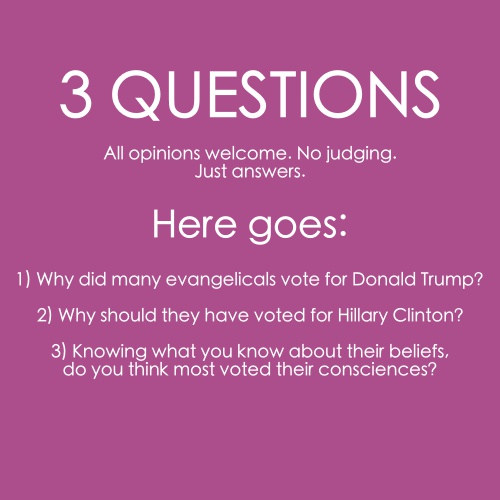
Take your shot.
Comment below.
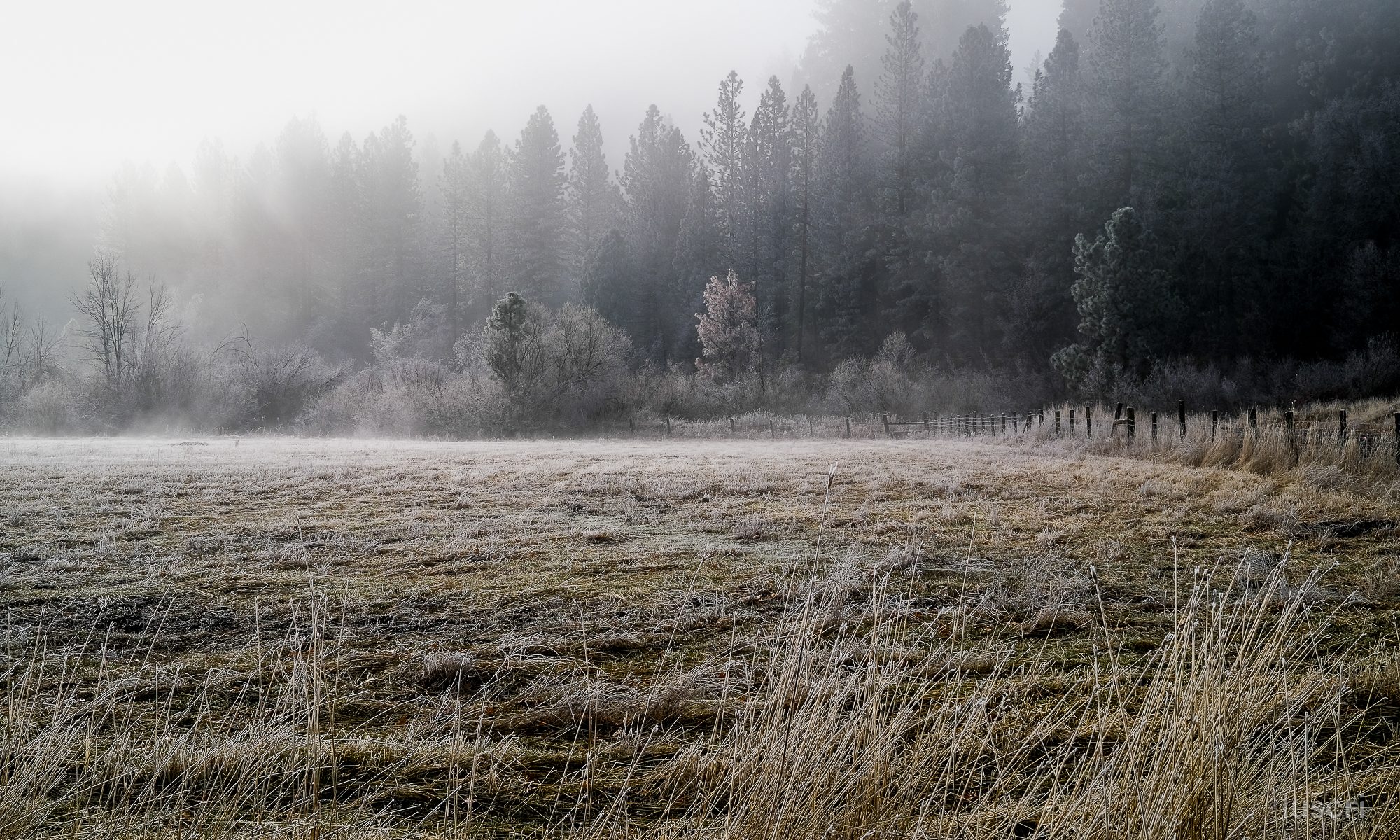
copywriter, photographer, Zamboni jockey

Comment below.
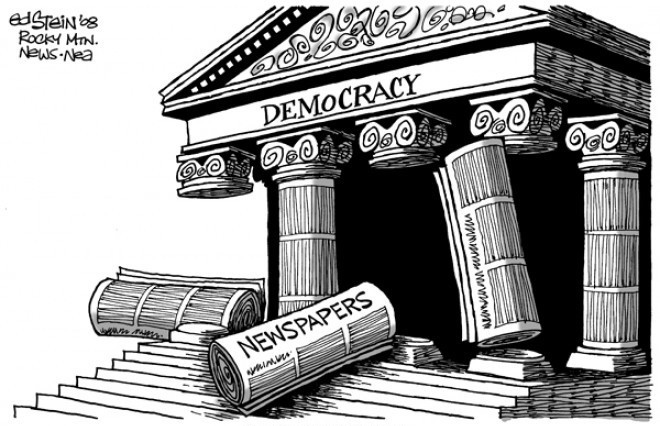
Trump’s war on the media is a THREAT to democracy? Please. Here you go again with hysterics, hyperbole and chicken-little reports.
Dear, media, your estimation of your importance to our democracy is vastly overblown.
Too many of you journalists are way too full of yourselves. Your vaunted “objectivity” is an antiquated notion believed by numbskulls. I don’t blame you for this—you’re only human. But humans are incapable of objectivity. Especially those who scribble in newsrooms.
And, most especially, those who still fancy themselves part of the … dun dun DUN! … Fourth Estate. What? Is this a secret snobby society? It’s not secret, but it IS secretive … and, yeah, kinda snobby.
The Fourth Estate can be defined as: A societal or political force or institution whose influence is not officially recognized. The Fourth Estate commonly refers to the news media, especially print journalism or “the press.”
In 1841 England, Thomas Carlyle, borrowing the phrase from Edmund Burke, used it to trumpet the power of the press in the reporters’ gallery in Parliament. He saw the press as an essential fourth estate tasked to “check” the three traditional estates of the realm: the church, the nobility and the commoners.
In the U.S., the fourth estate—better known as “the media”—has no direct equivalent to the English estates of the realm. But it DOES serve as an independent check on our three government branches.
Let’s say the executive branch, the president, acts in ways that are potentially criminal or “undemocratic.” Journalists ferret out information and evidence that exposes wrongdoing. They “blow the whistle” on the president just like they did when breaking the Watergate scandal. Boom! Busted.

By the way, members of the fourth estate—I’ll call them “Estatesmen” because it’s fun—raise the specter of Watergate any time they perceive an abuse of power by an administration. After all, breaking Watergate is the American press’ 20th-century crowning achievement.
So, what of the other two government branches? The judicial branch seems untouchable by Estatesmen. But then, legal decisions take much more time and effort to understand in order to attack. Plus, many of the big rulings have lately gone the way Estatesmen think they should.
The legislative branch—Congress—has always been open season. And it’s easier to take them down than it is a president. So, in a sense, the media does serve as a check on at least two of three genuine branches of government.
Which begs the question: Who CHECKS the media?
The notion that the modern media is a “Fourth Estate” that functions unofficially as a branch of government is merely a rhetorical device, not a serious statement of fact. It’s used to describe the power of the press in the realm of politics.
The American media is supposed to be this—a standard bearer for our right to freedom of speech protected by the First Amendment. Journalists, as citizens and members of the press, simply exercise their freedom of speech for a living—and are SUPPOSED to do so to INFORM us.
Specifically, journalists are trained to ask effective questions and craft stories for our information consumption. They inform us about our government by gleaning information through access to politicians, press conferences, and other info-gathering opportunities.
This should be the media’s function. There’s no mysterious, monolithic “Fourth Estate.” The fourth estate nonsense sounds impressive, but it’s fantasy and the stuff of Hollywood. It’s merely a media self-importance construct borrowed from an old English idea.
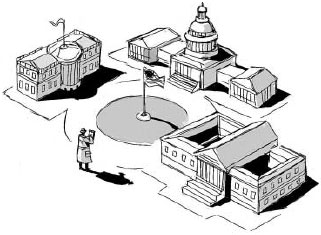
The fourth estate biz is silly. But it’s not dangerous like this truism:
Our media no longer merely provides information; they seek to shape public opinion. And what’s worse—they use their power to influence government policy so that it conforms to what they think is best for us.
That’s why, as a trained journalist and thoughtful citizen, the following relatively new teaser headline approach irks me … to the fourth estate.
It goes like this:
“Issue X: Here’s what you need to know” yada yada. Uh, excuse me; don’t tell me what I need to know. I can decide what I need to know based on raw information.
Hey, media—just do your jobs—INFORM me. Don’t try to INFLUENCE me by telling me what YOU think I NEED to know. The attempt to influence us and shape our opinions used to be more subtle. Not anymore. It’s obvious, ubiquitous … and dangerous.
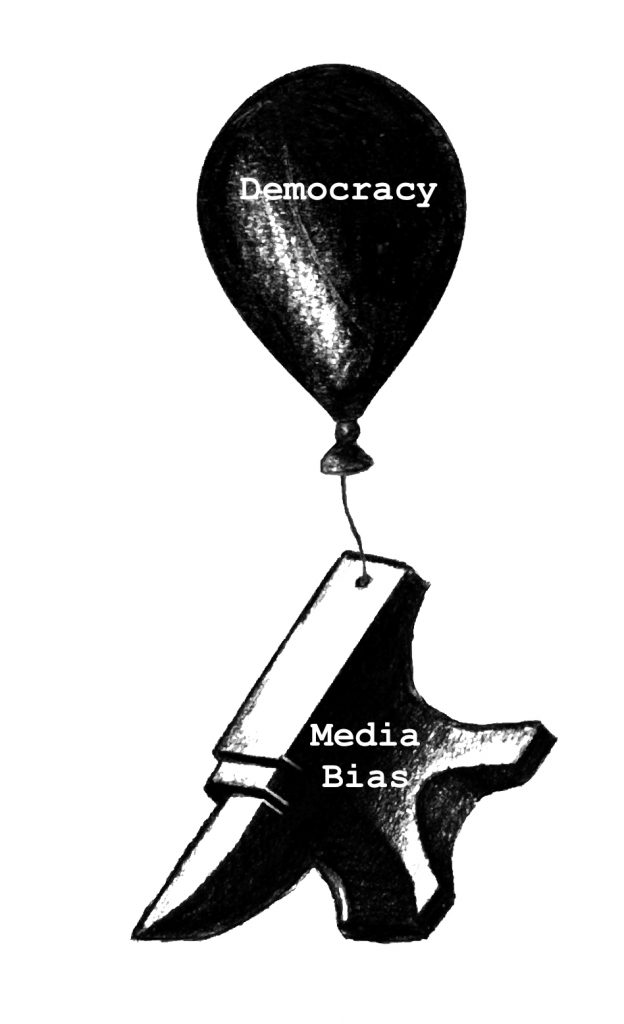
The media’s self-appointed mission to shape opinion and effect change—change they deem best for us— THIS is the threat to democracy.
Just to be clear, when I refer to the media, I’m not talking about entertainment/partisan media—Fox, MSNBC, HuffPo and others. O’Reilly, Hannity, and Maddow aren’t journalists; they’re personalities and “opinioneers.”
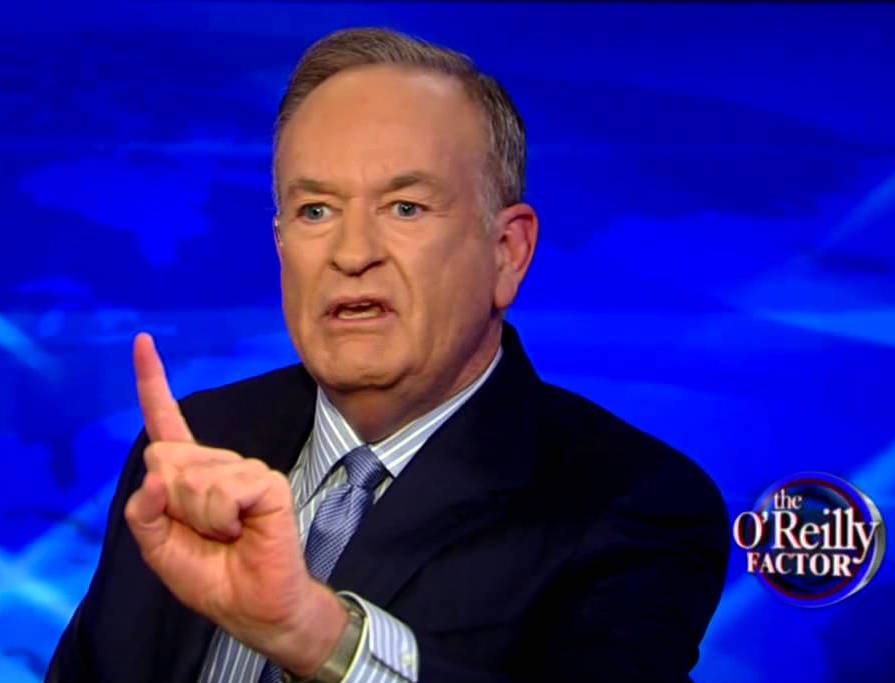
It’s not about you, Bill. O’Reilly: Passion and pompousness in one “pithy” package.
I’m talking about hard-core news media like ABC, NBC, CBS, CNN, BBC, The Washington Post, The Los Angeles Times, The New York Times, et al.
We should expect over-the-top, red-hot, partisan and biased “news” from “opinioneers” and those who are under no illusions about what they provide and the bias they bring with it.
The real pretenders are the “venerable” journalists—the stodgy Peter Jennings, Tom Brokaw, Woodward and Bernstein and now Jake Tapper types who claim objectivity and professionalism, but deliver biased, often overwrought opinion news.
And, by the way, media bias is not a right-wing conspiracy theory. Bias transcends media—it’s a uniquely and inextricably human characteristic.
While sitting in classes earning my master’s degree in journalism at the University of North Texas, I often had to stifle giggles when listening to one of my professors teach Media Ethics. As if the seriousness of the fourth estate stuff wasn’t funny enough, he ventured this hot opinion:
“You know, this thing about the media being biased, it’s not really true. The media is remarkably objective.”
I nearly fell out of my chair. At the time, I had recently finished a few months of internships at two local TV stations. The freshly tenured professor, I’ll call him Dr. Lane, was 10 years or so into his career, first in media development in Africa and the previous three years on faculty at UNT.
The professor probably had less recent newsroom experience that I did.
Typically, I would’ve challenged him on his ludicrous statement, as I had on a few others, but I couldn’t trust myself to choke down laughter. Plus, from the looks of a few of the other grad students, I didn’t have to. It was rich.
How do newsrooms seek to influence public opinion and, by extension, government policy? Allow me to show you the ways.
Story/no story
Now this is timely. Have you noticed how the media treats virtually identical circumstances involving Republican and Democratic presidential administrations in polar opposite ways? Positively/neutrally or negatively?
Look at these photos and tell me; is there an issue? And if there is a legitimate issue, how are the circumstances any different?
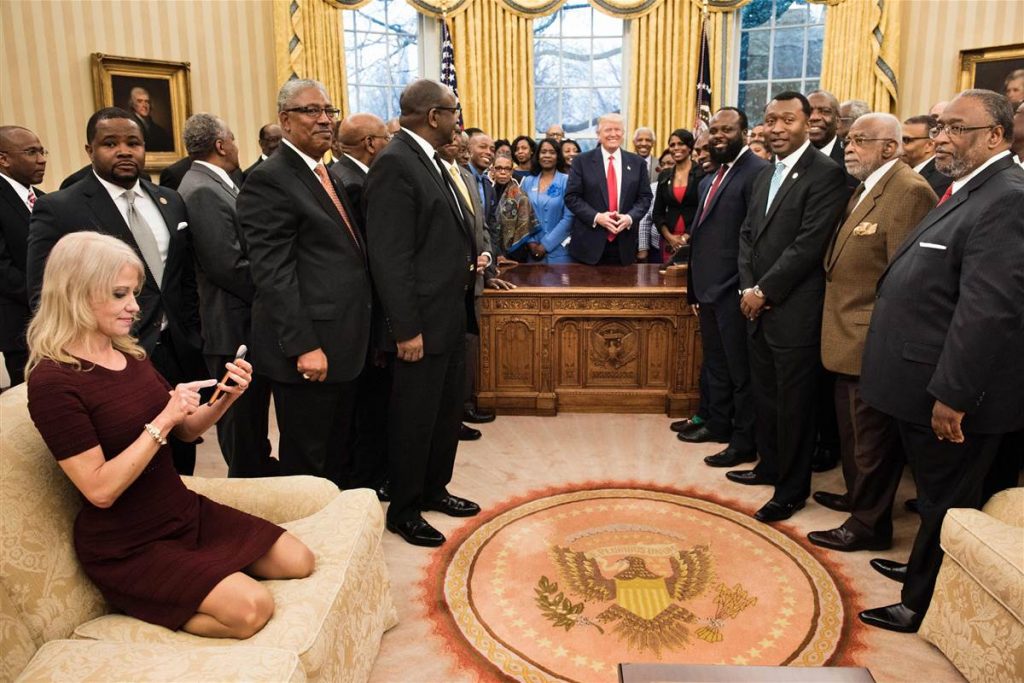
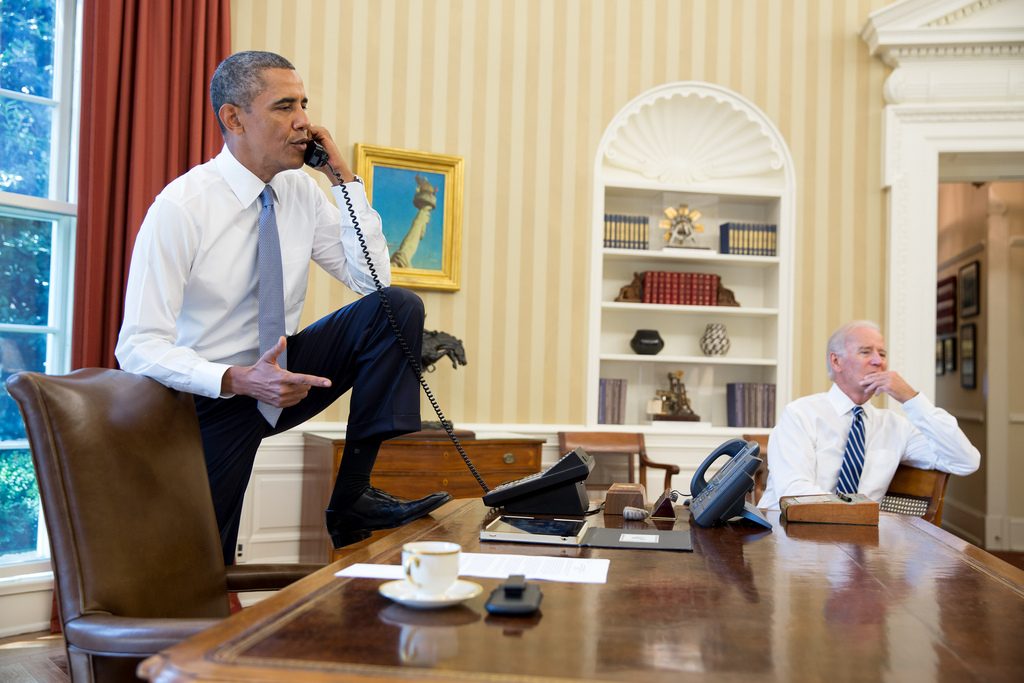
Conway and Obama. Both work(ed) in the Oval Office. Both have at least either a foot or a shoe on a piece of furniture in the Oval Office.
Judging from media coverage, one is a HUGE story; the other is a non-story. Granted, the press covers stuff that sets Twitter and partisan media on fire. I get that. But if they cover one instance, shouldn’t they cover the other? They should, but don’t because they’re biased and agenda driven.
If either is disrespectful, shouldn’t the President of the United States be held to a higher standard? Wait? Is it disrespectful of a race? Does this look disrespectful?
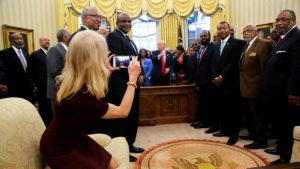
Story selection
Subjective editors select stories, headlines and photos that reflect their news entity’s voice (politics). Reporters write stories that push viewpoints they hold.
Perspective omission
This is the practice of omitting a perspective by ignoring it. Try this: Familiarize yourself with conservative and progressive perspectives on an issue. Then look for both viewpoints in an article. This is Journalism 101.
Story placement
Hiding a story is as simple as burying it. Because most people read only headlines, one can downplay stories supportive of an opposing view by burying them deep in a Web or printed page.
Photo bombing
Want to make someone look foolish? Drop in an unflattering photo. Better yet, match it with a subtle dig in the headline.

The bomb above offers a two-fer bias benefit: Unhinged “hate” and small-handed compensation.
Story suppression
Want to suppress a story that could hurt your candidate’s election chances? Don’t cover it or give it short shrift even though you know that if it were about the opponent, you’d run it with everything you’ve got.
Labeling
The media’s power to label people is subtle, but potent. Conservatives are stigmatized as “alt or far right,” “ultra-conservative,” or “right-wing extremists,” while far lefties are “progressives,” “liberals,” or “moderates.”
You prove it—to yourself. Gather information. Make up your own mind. But don’t be influenced by anyone you don’t know and/or respect.
It only takes a tiny twist to turn information dissemination into influence shaping. I’ve worked in newsrooms. I understand journalists and what many think about government. They’re smart and passionate, which makes them prone to activism.
Think journalists aren’t biased when it comes to politics? Trust me—they are. And like most persuasive, passionate people—they want you to think like they do. And they’re willing to help you think like they do by shaping your opinions on the issues.
Journalists know that influencing today’s media consumer is child’s play.
Most media members aren’t hacks. They know exactly what they’re doing. Activist journalists are blinded by their sense of the “rightness” of their causes. And whether they realize it or not, they sacrifice journalistic integrity for it.
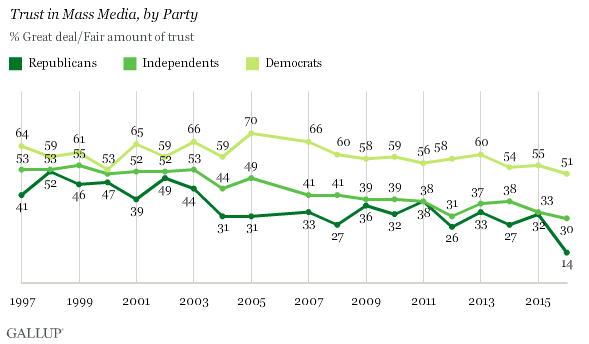
Journalistic objectivity is an impossibility. We all have our bents, perspectives and preferences. Objectivity is merely something to strive for. The problem is that many in the media don’t even bother striving anymore.
They seem more interested in helping craft the nation into their version of what America should be. And they want us on board. If for no other reason than to help elect leaders who share their vision.
This is activism not journalism. And IT, not Donald Trump’s silly, immature war with supposed “fake news,” is a threat to our democracy.
Hey, media, will you please stop the over-the-top apocalyptic warnings about threats to democracy and focus on your true calling? Strive for objectivity. Leave your politics in the break room. Inform us.
No president can revoke the First Amendment. Trump’s press war is nothing but thin-skinned, childish behavior. The threat you face is our distrust.
And no one can make you irrelevant, but you.

Warning: This post is intended for mature readers who can disagree agreeably, resistance soldiers and those who are considering joining the resistance.
I’m trying desperately to understand what drives your resistance.
It seems that you’re watching the implosion of our country and its values at the hands of a misogynistic, bigoted, ill-suited-for-the-job monster of a new president. You’re still reeling from the loss of your preferred candidate and feel galvanized to resist the tyrant at every turn.
You witness the 120-day ban on immigration from seven countries, and you see a “Muslim ban” that reeks of discrimination and bigotry and fear of a religion. But let’s consider—Is this a ban based on a religion or on points of origin? Muslim emigrants and refugees from Libya, Egypt, Turkey and Afghanistan can come.
If it’s a ban on a religion, why are they welcomed?
This temporary ban IS discrimination. But it’s discriminatory not of a religion, but of citizenship. And though the seven listed countries are majority Muslim— Christian, Hindu, Jewish and Scientologist emigrants from those nations would also be denied immigrant status under the ban.
Also, let’s be factual—this discrimination against citizenship doesn’t apply to green card holders or to those with legal status—only to those seeking a path to citizenship via immigration.
The ban also discriminates based on behavior. Consider this hypothetical scenario:
Let’s suppose you have a guesthouse on your property, and you advertise it for rental. Among the applicants are three guys, let’s say, who are devout Satanists. You do some research and discover that according to their satanic bible, they’re required to offer animal sacrifices to their god.
You also discover that other Satanists have used house cats and dogs captured in neighborhoods where they live as sacrifices. You have dogs and cats—and young children. And there are other applicants—one is a retired schoolteacher and the other is a “gearhead” who was sporting a greasy t-shirt when he came to see about the rental. What do you do?
You discriminate against the gearhead because you don’t want drip pans filled with oil sitting around the back yard. Now you’re left with two applicants: the retired schoolteacher who could be a potential positive in the lives of your young children as a very close neighbor and three young committed Satanists. How do you choose?
You discriminate based on potential behavior and politely tell the Satanists that you’re renting to someone else and secretly wish them bad pet hunting—somewhere else.

How does this relate to the behavior of Muslims?
While most Muslim refugees who seek to immigrate are fine, upstanding, good-hearted souls in search of a better life, there are other Muslims who may want to come who’ve pledged to follow Islam to the letter of the Quran and who burn with desire to force infidels to embrace their religion or die.
What do you do, resistance? What does a president who’s responsible for protecting Americans—Muslim or of any other faith—do to prevent those committed to perpetrating more 9/11s, more San Bernardinos, and more Orlandos from coming here posing as immigrants?
We can agree that the ban is discrimination. Do you truly believe it’s based on religion? Do you care what it’s actually based on? I fear that you don’t care—that you employ the ban-on-Muslims narrative for effect. Tell me the truth—I want to believe you.
This temporary immigration ban is NOT a ban on a religion. It’s not a Muslim ban. And we have yet to see if all its provisions will become permanent, or if it can stand up to legal scrutiny. In my view, At THIS POINT, it’s not a legitimate reason for resistance.
Here is, to my mind, the logical, rational truth:
Your resistance is a farce. You’re fighting phantoms. You’re breathing fire because you’re fearful of what you think a president will do based on his foolish words and an equally frightened media. Please get a grip and some perspective.
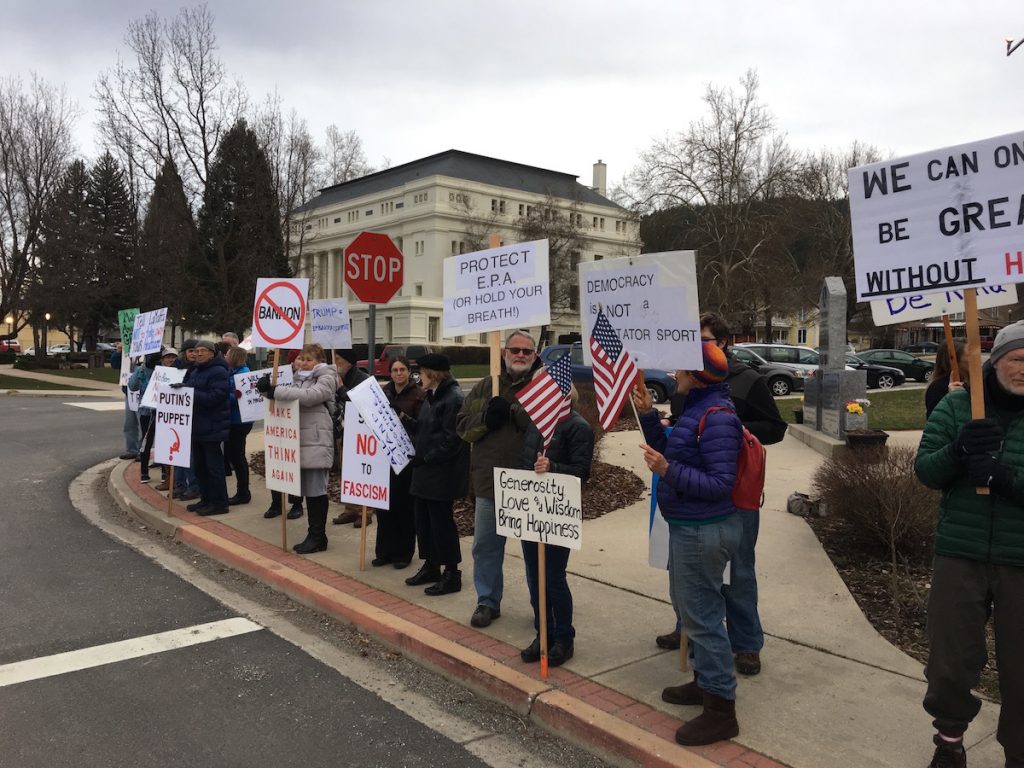
Is this temporary country-based ban on immigrants worthy of resistance?
How about past and potential discrimination by high-ranking officials in government agencies toward businesses and religious groups they disagree with?
How about Muslim Americans who push for the adoption of Sharia law, which calls for the subjugation of women and sanctions honor killings?
Or resistance to the drug cartels who exploit open borders and use human beasts of burden to provide drugs to addicted millions? Do you really think resisting the building of a wall that could help reduce this double enslavement is more worthy of your resistance?
How about resisting terrorist-sanctioning theocracies’ that want to wipe a country and an entire race off the map?
Do you actually think that resisting attempts to get sanctuary cities to enforce state and federal laws regarding illegal aliens more worthy of your resistance?
Try explaining your reasons for resistance to someone who understands real racism. Talk to people who have experienced the hatred and intolerance and fear that genuine fascists use to foment the murder of “undesirables” and infidels and Jews.
Could it be that partisan political and ideological agenda drives your resistance, not a reaction to real injustice? Do you not see the absurdity of your resistance when compared to resistance to the Third Reich or to the Pol Pot regime or to Stalin’s reign of terror?
You’re clamoring for resistance to “fascist” actions that have yet to happen. And you’re calling for others to join you based on fears filtered through election disappointment, ideological bias and personal disgust.
Your fear and loathing of a thin-skinned, heavy-handed, loose-cannoned neophyte of a president has shaken your grip on reality.
Yes, Trump says foolish, objectionable things. And I know—his thoughtless words and machismo do nothing to allay fears. But is it possible that he uses bravado to mask inexperience and dispel doubts about whether he’s up to task? Have his actions risen to the level that warrants the intensity of the resistance thus far?
It IS possible that you’re resisting a bogeyman. Let’s wait until the bogeyman shows himself a tyrant, then let’s resist him. With everything we’ve got.
But until then, open your fists, and get a grip.

Suppose the tyrant orders suppression against Muslim Americans with a form of Kristallnacht—German for “night of crystal”—during which hordes of Nazis broke windows and vandalized Jewish-owned stores and property throughout Germany and Austria.
Resist.
Say that devil Trump signs an executive order to round up and illegally deport Mexican Americans suspected of harboring or aiding undocumented workers.
Resist.
I’ll join you in a heartbeat.
Now I’ve heard about fascist Trumplings smashing windows and scrawling swastikas on mosques and minority-owned businesses. This monstrous stupidity is worthy of all our resistance. To the point of resorting to our resistance fists, if necessary.
In my view, at present, your “resistance” is much ado about nothing. I grant you—Trump’s actions have crossed ideological lines. But they haven’t crossed legal or moral lines, in my opinion.
I know. You probably hold that Trump HAS crossed legal and moral lines, or that he’s about to. That’s your perspective, and I invite you to persuade me on this score. Persuade. Don’t dodge questions and call names.
Let’s talk about it. But first, let’s talk about words.

You in the resistance hurl these words like toxic grenades to neutralize and demonize opposition. Do you realize the damage you’re doing to honest debate?
Scroll up to the five-fisted recruitment banner at the top of this page. Spread the deliria? Really? Do those in the resistance even know what they’re calling for or to what they want us to join?
To “spread the deliria” is to propagate:
A more or less temporary disorder of the mental faculties, as in fevers, disturbances of consciousness, or intoxication, characterized by restlessness, excitement, delusions, hallucinations, etc. A state of violent excitement or emotion.

Is it possible that most of you in the resistance have yet to face real bigotry or genuine hate? Will you consider the possibility that much of the intolerance is coming from your side?
I posted a question on the Facebook page of John Pavlovitz, a former pastor and now blogger, speaker and author who appears to align closely with the resistance. I also posted a link to my Trump is not the devil. And God is not a clockmaker post, in which I argue that God rigged the election.
Based on the tone of his answer, I made the mistake of commenting (subjectively) that he seemed angry and arrogant, for which I later apologized. He hasn’t responded, but one of his followers did. I’ll call him Tim.
Here’s a portion of Tim’s opening comment:
“Realistically, no politician in America is going to FORCE you to do anything, but in the case of many of the things Trump has done and continues to do, it really is a choice between his views and God’s. Trump’s immigration policies are plainly contradictory to what the Bible teaches about loving refugees and welcoming immigrants.
You can’t be a strong Christian and succumb to fear of Mexicans and Muslims. You feared that Hillary would be the one to make you choose between your faith and the US government, but in fact Trump has done just that. You probably don’t regret your vote just yet (I’m quite sure you voted for him) but you will.”
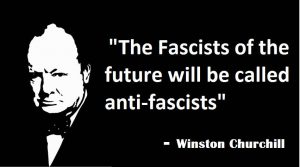
Here are the top and bottom sections of my reply:
“Thanks for your thoughtful comment. I agree that American politicians don’t force us to do anything and didn’t mean to imply that in my blog post. Glad you pointed that out though, so I can tweak it. I think we just disagree about Trump’s immigration policies.
To my thinking, placing a temporary immigration hold until extreme vetting processes can be developed and implemented is wise. I think many who decry Trump’s immigration policies are assuming the worst and inflating his intentions based on bias and actions that have yet to happen.
I don’t regret anything about my vote—my vote is irrelevant—I live in California. Unless you’re into the popular vote nonsense. I don’t regret it and won’t regret it because I believe God is in complete control and that he appoints leaders—good and bad—not for our comfort or sense of rightness, but for his master plan.”
Tim:
“I believe you’re a coward. Sorry, I know that’s blunt, but i believe it to be true for a couple of reasons:
1. You believe more “vetting” of refugees is necessary- even though NOT ONE SINGLE American life has ever been taken at the hands of a refugee. This means your fear (yes, it is FEAR) of those refugees is based not on facts or reason but by something else completely–the fact that they look different and worship differently than you, perhaps. Irrational fear of different cultures is cowardly.
2. You refuse to take responsibility for your vote. If Trump leads us into WWIII, I am 100% sure people like you will throw your hands in the air and say “It’s in Gods hands” when in fact YOU were the one who elected him.
Take responsibility for your part in this. I don’t care that you live in CA. You’re sitting here blogging about how we should “submit to our new leader.” You did this. If you’re not comfortable with that, then repent. It’s not too late. The resistance is just starting.”
I added italics because it’s more spooky and fun that way. Not to mention creepy. The resistance is just starting? V for Vendetta?

After repeatedly telling me what I think and how I feel, Tim proceeded to call me—sprinkled throughout our combined 18 comments and replies—coward, fearful, irresponsible, irrational, hypocrite, foolish, apathetic, denier, satanic, and an embarrassment.
I encouraged him to read my post decrying name-calling, Uncivil Discourse: How we’re vilifying viewpoints, warping words and destroying debate. His response? To tell me that he’s not Jill, the open-minded, big-hearted modern progressive “thinker,” of the post’s hypothetical debate scenario.
From this point our “conversation” plunged downhill and eventually off the cliff despite my many attempts to engage him respectfully and ask clarifying questions. I spent most of my time trying to get him to stop telling me what I think and to accept my telling him what I think.
During the free fall, Tim came up with these highly empirical stats and predictions:
“Trump has proven himself, beyond a shadow of a doubt, to be 100x more dangerous than any Syrian refugee.
Trump’s careless pen stroking has already cost the lives of over 30 civilians and a US Navy SEAL. So yeah, trump has killed more Americans than Syrian refugees have. It’s proven and measurable. Perception doesn’t change the fact that those people are dead and many thousands more will die if the ACA is repealed.”
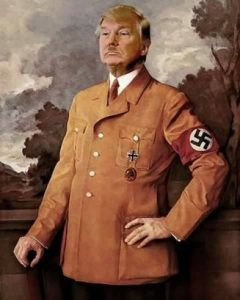
Dear resistance,
Does a president “cost lives” by “pen-stroking” (signing executive orders)? Did Trump’s predecessor’s pen-stroking cost lives?” Is the costing of lives based on your agreement or disagreement with the merits of an executive order?
These are the kinds of questions I asked Tim. Ad nauseam. Each and every time, he either ignored or twisted my laser-focused questions into assumption-bloated, over-generalized and absurdly false caricature.
It was like playing catch with someone who kept throwing the ball AT me, instead of TO me, and so ruined the game.
Had Tim reigned in his zeal and buffered his bias for a nanosecond, had he addressed my questions and points, had he taken me at my word concerning my thoughts and feelings, we both might have learned something.
Instead he engaged in talking points, bullying and name-calling—the most uncivil of discourse. We missed an opportunity to better understand one another’s perspectives on some crucial issues.
Here’s a question for you, resistance: Is Tim the exception or the rule of the resistance? To me, he seems to have embraced the call to spread the deliria by waving and brandishing both fists.
The resistance’s call to spread deliria is apparently being taken quite literally by groups like the actionnetwork.org. Here’s their statement of purpose from their Website:
“This election has shaken us to our core. Millions of Americans are feeling desperate to find ways to get involved. We need to show the whole political establishment that there is a massive progressive force that will fight against Trump’s extreme agenda of greed and hate every step of the way.”
Agenda of greed and hate? Really? It’s silly, lazy fighting phrases like this that make the resistance difficult to take seriously.
Here’s a more militant sounding call to action from The Donald J. Trump Resistance (at least they’re respectful in adding his middle initial.) And they seem to think that making Each Word Start With Uppercase Letters Makes THEIR Tagline That Much More Impressive:
“Where WE Make Hatred, Bigotry, Xenophobia, Sexism, Racism, and Greed Pay the Price”
What IS the price, exactly?
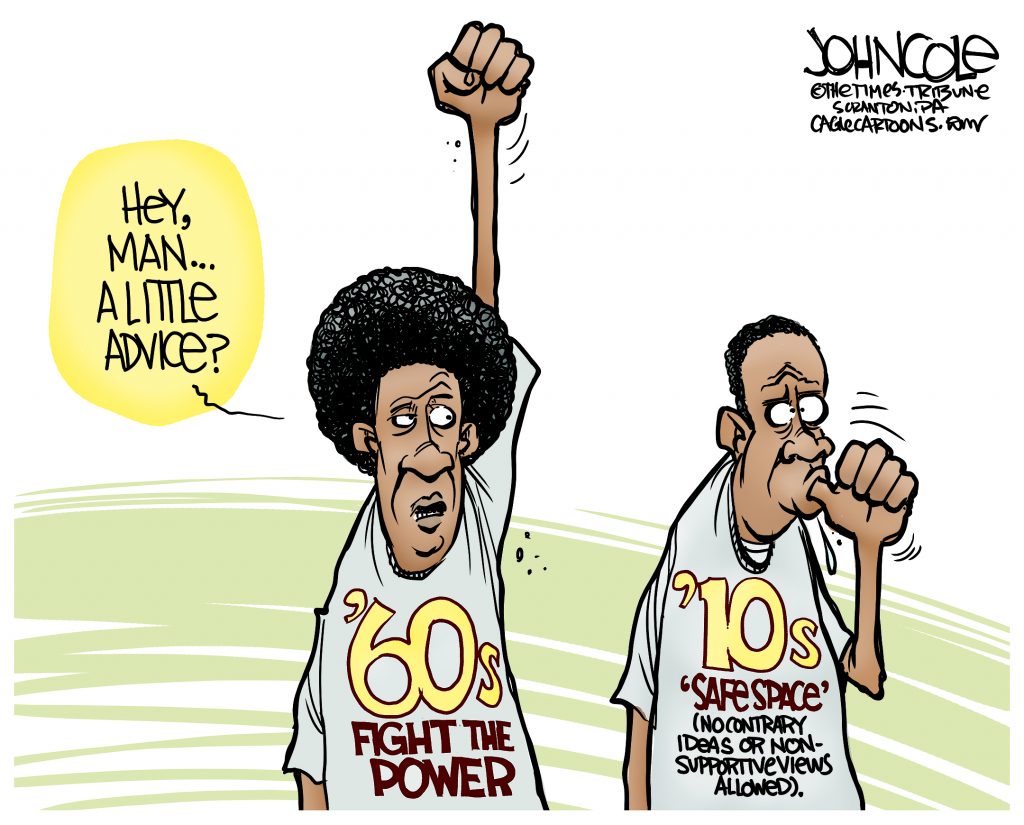
Here’s some advice for you, resistance that, if heeded, would make your cause much more attractive to doofuses like me:
Shelve your exertions until the time comes when resistance is truly necessary. Wait for genuine governmental abuses of power—and then act. If presidential overreach in the form of executive orders is the standard, shouldn’t we have resisted during the last eight years? Where was the “resistance” then?
And finally—and perhaps most importantly—resist the urge to engage in uncivil discourse. We can disagree agreeably. Ask and ANSWER clarifying questions to better understand another’s point of view. Listen, THEN talk.
I believe in resistance. If I were in the Star Wars universe, I’d join the Rebellion. Or better yet, the Jedi Knights. Or even as a third with Han Solo and Chewbacca.
But I won’t join a joke.
I resist you, resistance. In fact, in light of events as they stand AT THIS TIME, I wouldn’t join any of you jokers—even if you offered me the Millennium Falcon.
Stop muddling meaning and lobbing word grenades. Get a grip on the gravity of our issues. Save your powder for the real battles, if and when they come.
Get serious, not delirious. Then, count me in.